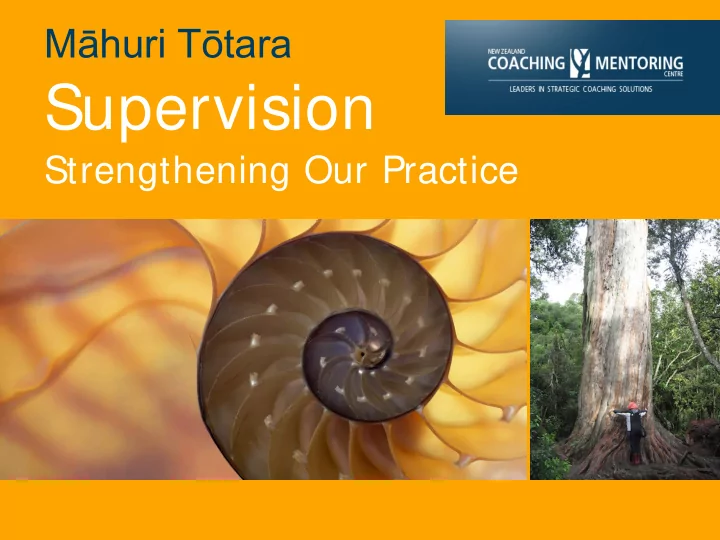

Māhuri Tōtara Supervision Strengthening Our Practice
The plan… • Supervision – what is it? • Benefits of supervision • What can go wrong? • Supervision in Action – strengths based supervision
“Life is too short to make all your own mistakes yourself.” Winston Churchill
Supervision • An exchange between practising professionals to enable the development of professional skills and competence Butterworth • A formal process of professional support and learning that involves reflecting on practice in order to learn from experience. Kohner
SUPER+ VISION • Guided reflection rather than correction • Helping people look at what they are doing in the light of their intentions
What they What they have the are currently capacity to doing do
Supervision Regular, protected time for in- depth reflection on professional practice. Bond & Holland Clinical Supervision Skills for Nurses
Supervision as… An opportunity for people to reflect on and improve their own practice in order to support clients to achieve the outcomes that are important to them. Richmond NZ Trust Supervision Policy 2014
Supervision “A co-operative, work oriented relationship that assumes the supervisee possesses the strengths, abilities and resources to resolve problems and achieve goals.” ‘Solution Focussed Supervision – the coaxing of expertise.’ Thomas 1994
3 Functions of Supervision Educative function Development of practice – peer support competencies Development of practitioner – ‘inner game’ Accountability function Accountability = to ‘account for’ choices of interventions Enabling people to work to the organisation’s policies, the peer support competencies or particular practice approaches (outcomes focused practice, Te Whare Tapa Wha…) Supportive function Supporting peer support workers to sustain themselves in the role Making connections between the personal and the professional Kadushin
Theoretical Applied knowledge Practice
Supervision – what’s it for? to provide regular opportunities to reflect on your work to develop skills and strategies that allow you to be more effective in your role to gain insight and understanding about why things turned out the way they did to receive feedback on your actions/approach/behaviours to be validated and supported as a person and as a practitioner to ensure that you are not left to carry, alone, difficulties, problems etc. as a result of the work that you do to offload and express personal responses/feelings that arise as a result of your work to be proactive rather than reactive to manage your self in your role to check decisions and choices you have made in the course of your work to ensure quality of care for clients. Adapted from Shohet & Hawkins, Supervision in the Helping Professions
Internal One to one External supervision One to one Cultural Peer Types of supervision Supervision Supervision Peer group supervision ? Crisis Group supervision Supervision
It’s all about the purpose • Mentoring - benefit for the individual • Coaching – benefit for the organisation • Supervision – benefit for the client
Modes of Supervision Non directive Directive Encourages the supervisee to think Has the authority for themselves Is the expert Shares authority with the supervisee (co-operative) Advises Sees the supervisee as capable and resourceful Sees the supervisee as the source of the solution
What gets in the way of great supervision? • What gets in the way of people getting the most out of supervision? • What hesitations, anxieties do people come to supervision with?
People do the best they can with the resources they have.
Voluntary Principle People are self directed Motivated from within
OK to make mistakes Unskilled Incompetent Vulnerable
Supervision in Action 1 1. Supervisee Tell a story of a recent success –a situation that went unusually well or had a positive outcome or an aspect of your work that is going well. (2 or 3 minutes uninterrupted) 2. The group listens, jots notes and gives positive feedback on either your strengths what they feel contributed to your success what has genuinely impressed them about your approach, interventions or behaviours a positive response to your story What I think made that effective was… I liked hearing you say that… What impressed me was… What really stood out for me was… Supervisee listens in silence 3. Supervisee Comment on what feedback stood out for you, any new perspectives, insights, learning or anything else to finish the conversation for now.
The mind is like a parachute. It works better when it’s open.
Supervisee Honest Honest Open Open Confidential Confidential Organisation • Manager Supervisor • HR • Graduate Programme co- ordinator
The outcomes focussed supervisor… • Is client centred in their focus (focuses supervision conversations around client outcomes) • Asks questions to support supervisees to analyse and make sense of interventions • Encourages reflection – thinking and talking time • Listens for positive aspects of practice and things that are going well • Sees outcomes for staff as important as outcomes for clients e.g feeling valued and respected
Building the reflective practitioner who… • Engages with the experience of the client • Analyses and makes sense of their interventions • Collaborates with the client to assess strengths, resources, needs and risks • Helps the client make sense of their experience • Reviews progress against shared goals • Is open to learning
What do you want from me?
Find another perspective
Recommend
More recommend